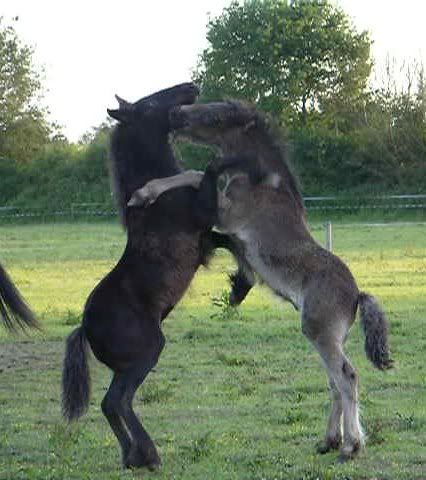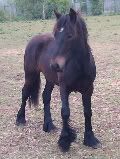Post by flintfootfilly on Apr 8, 2012 12:02:41 GMT -1
Hope no-one minds me rejoining this group after a few years' absence, but I have a problem with my gang of Dales ponies and wondered whether anyone on here could help.
Has anyone else had performance problems in their Dales ponies, combined with high muscle enzymes? Would really love to hear from anyone who has, as I try to figure out what’s going on with my gang.
Over the last few months, I’ve been looking into the cause of one of my Dales pony’s reluctance in his work (reluctant to trot, slow, stiff hind limb action, grinding to a halt, inconsistent carriage) and have had several blood tests done along the way, as well as a biopsy to check for signs of muscle disease such as EPSM/PSSM/RER etc.
I’ve also had all the ponies tested by hair sample for type 1 EPSM, and all came back negative for that. Only £25 per pony, so quick, easy and painfree to ponies and my wallet! So at least that ruled out one type of EPSM.
Anyway, last week I decided to have all my ponies (5 purebred Dales ponies and one partbred Dales) blood tested at least as a baseline for future reference, but also because I’ve had a nagging feeling about a few of them being not quite as consistent in their work as they might be.
The blood results have ALL come back with abnormal muscle enzyme levels (CK, AST and LDH), and I could have predicted those which would come back highest and lowest (because they tie in with the scale of reluctance to work): Max (the pony whose had most investigations) has CK levels 10X the “top normal” of 350; the rest of the gang range from marginally high to twice or three times top normal, and all are above the lab’s reference range for “normal”.
To have quite so many abnormally high muscle enzyme results is starting to sound a little more than coincidence to me. Common links are me, my land (although one pony has barely been on grass in the last 9 months), my hay/haylage (bought in from neighbouring land), the drinking water, the way I train them (minimal stress, gradually increasing work, and beside which one of them has been retired two years, and two are only just coming into work as youngster )......
Muscle enzymes from the most recent resting bloods came back as follows:
(“normal” reference range from my lab: AST 100-370; CK 20-225 (with “top normal” of 350 being recognised by experts such as Stephanie Valberg/Sue Dyson, Beth Valentine, Dr Kellon); LDH 130-1085
Max AST 526; CK 3,578; LDH 1,261
Megz AST 362; CK 542; LDH 964
Rose AST 609; CK 913; LDH 2,130
Fox AST 622; CK 493; LDH 1,140
Zebedee AST 405; CK 331; LDH 1,422
Rock AST 418; CK 562; LDH 1,697
I’m in touch with two American vets – Beth Valentine (who is an expert on EPSM in draft horses) and Dr Kellon (who runs a series of online courses for horse-owners and is someone who really hunts for an answer to veterinary problems), and they have both been incredibly helpful so far.
My own vets are being as helpful as they can, but they are not familiar with this type of muscle problem. I’ve also been in touch with a couple of people from this board who have had ponies with muscle problems. It’s probably unlikely that I’ll get to the bottom of what’s happening with my gang, but I’m starting to wonder whether the muscle issues are environmental (ie related more to me and how I manage the ponies) or whether it is something which is found in other Dales ponies?
If anyone has experienced similar problems with their Dales pony, or had abnormally high muscle enzyme levels in their blood tests, then I’d really love to hear, either on here or by pm. Muscle enzyme levels and a brief outline of any problems you noticed with the pony’s performance would be really helpful.
I promise I will keep all details confidential, and will only use them to help in the management of my gang or to help experts find an answer.
Thank you!
Sarah
Has anyone else had performance problems in their Dales ponies, combined with high muscle enzymes? Would really love to hear from anyone who has, as I try to figure out what’s going on with my gang.
Over the last few months, I’ve been looking into the cause of one of my Dales pony’s reluctance in his work (reluctant to trot, slow, stiff hind limb action, grinding to a halt, inconsistent carriage) and have had several blood tests done along the way, as well as a biopsy to check for signs of muscle disease such as EPSM/PSSM/RER etc.
I’ve also had all the ponies tested by hair sample for type 1 EPSM, and all came back negative for that. Only £25 per pony, so quick, easy and painfree to ponies and my wallet! So at least that ruled out one type of EPSM.
Anyway, last week I decided to have all my ponies (5 purebred Dales ponies and one partbred Dales) blood tested at least as a baseline for future reference, but also because I’ve had a nagging feeling about a few of them being not quite as consistent in their work as they might be.
The blood results have ALL come back with abnormal muscle enzyme levels (CK, AST and LDH), and I could have predicted those which would come back highest and lowest (because they tie in with the scale of reluctance to work): Max (the pony whose had most investigations) has CK levels 10X the “top normal” of 350; the rest of the gang range from marginally high to twice or three times top normal, and all are above the lab’s reference range for “normal”.
To have quite so many abnormally high muscle enzyme results is starting to sound a little more than coincidence to me. Common links are me, my land (although one pony has barely been on grass in the last 9 months), my hay/haylage (bought in from neighbouring land), the drinking water, the way I train them (minimal stress, gradually increasing work, and beside which one of them has been retired two years, and two are only just coming into work as youngster )......
Muscle enzymes from the most recent resting bloods came back as follows:
(“normal” reference range from my lab: AST 100-370; CK 20-225 (with “top normal” of 350 being recognised by experts such as Stephanie Valberg/Sue Dyson, Beth Valentine, Dr Kellon); LDH 130-1085
Max AST 526; CK 3,578; LDH 1,261
Megz AST 362; CK 542; LDH 964
Rose AST 609; CK 913; LDH 2,130
Fox AST 622; CK 493; LDH 1,140
Zebedee AST 405; CK 331; LDH 1,422
Rock AST 418; CK 562; LDH 1,697
I’m in touch with two American vets – Beth Valentine (who is an expert on EPSM in draft horses) and Dr Kellon (who runs a series of online courses for horse-owners and is someone who really hunts for an answer to veterinary problems), and they have both been incredibly helpful so far.
My own vets are being as helpful as they can, but they are not familiar with this type of muscle problem. I’ve also been in touch with a couple of people from this board who have had ponies with muscle problems. It’s probably unlikely that I’ll get to the bottom of what’s happening with my gang, but I’m starting to wonder whether the muscle issues are environmental (ie related more to me and how I manage the ponies) or whether it is something which is found in other Dales ponies?
If anyone has experienced similar problems with their Dales pony, or had abnormally high muscle enzyme levels in their blood tests, then I’d really love to hear, either on here or by pm. Muscle enzyme levels and a brief outline of any problems you noticed with the pony’s performance would be really helpful.
I promise I will keep all details confidential, and will only use them to help in the management of my gang or to help experts find an answer.
Thank you!
Sarah














 can help with the problem but yes welcome back xxx
can help with the problem but yes welcome back xxx